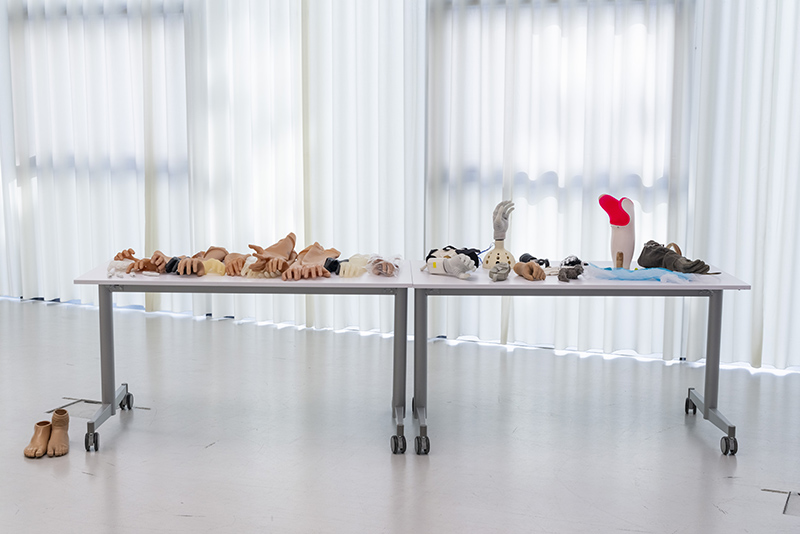Of Cyborgs, Prostheses and Crip_tonite:
Empowering the Pathological in Aesthetics, Arts and Technology
Dis_ability studies, queer and crip theories offer several new avenues for researching the meaning of bodies in aesthetics. While poststructuralism has challenged the concepts of normal and the pathological and portended the objectifying clinical gaze in modern medicine and therapy (Canguilhem, Foucault), feminist Posthumanism has developed an array of metaphors to further distort the master narratives in technoscience and make them fruitful for their own agendas. The formerly-pathological materializes in feminine cyborg-fictions that aim to overcome the boundaries of nature and culture and give rise to the study of damaged and traumatized bodies.
Make it messy and make it count. Ever since Laurie Anderson’s 1982 pop-debut O Superman, we have hijacked pop-culture and questioned the wet dreams of transhumanism and cybernetics. We think of cyborgs as “a way out of the maze of dualisms” (Haraway). We render the tyranny of ableism and functionalism in disability studies (Kumari Campbell) and tackle the vulnerability of the Moderns (Harrasser). We try to understand the feeling of damaged bodies, as they have a great deal to teach us about the embodied mind (Ramachandran and Hirstein).
This lecture will touch on questions of how bodies, their pleasures as well as displeasures, are represented as either “normal” or abject. We will come to understand the plurality of damaged and undamaged bodies as well as individual norms unable to be perceived by any-body, but themselves.
As a thought experiment—a posthumanist daydream—we will philosophize upon the weaknesses and subjacent idealisms that run throughout the arts, aesthetics and technology. We will take a step back from what ‘we think we know’ and counter our own master narratives with Crip_tonite as a neo-material antidote to unravel the persisting blind spots and empower bodies and minds to invent new approaches towards an ontology of the pathological.
Lecture at The Institute for Art Education at the Academy of Fine Arts, Vienna.
First session on Tuesday, March 1st, 2022, 13:00-16:00. IKL, Room 2.11, Karl Schweighofergasse 3, 1060 Vienna.
Dates: 15.03., 29.03., 12.04., 26.04., 10.05., 24.05., 28.06., 19.07.2022.
Further information here.
LITERATURE
Aloi and McHugh, eds. Forthcoming 2021. Posthumanism in Art and Science: A Reader. New York: Columbia University Press.
Braidotti, Rosi. 2019. Posthuman Knowledge. Cambridge: Polity Press.
Canguilhem. 1978. On the Normal and the Pathological. Translated by Carolyn R. Fawcett. Dordrecht NL: D. Reidel Publishing Company.
Davis, ed. 2006. The Disability Studies Reader (Second Edition). New York / London: Routledge.
Harrasser. 2016. Prothesen: Figuren einer lädierten Moderne. Berlin: Vorwerk 8.
Haraway. 1991. “A Cyborg Manifesto: Science, Technology, and Socialist-Feminism in the Late Twentieth Century.” In Simians, Cyborgs, and Women. The Reinvention of Nature, 149–81. London: Free Association Books.
Kafer. 2013. Feminist, Queer, Crip. Bloomington/Indianapolis: Indiana University Press.
Kumari Campbell. 2009. Contours of Ableism: The Production of Disability and Abledness. New York: Palgrave MacMillan.
Kliche. 2000. “Ästhethische Pathologie.” In Archiv für Begriffsgeschichte, 197–229. Vol. 42. Hamburg: Felix Meiner Verlag.
Langer. 1953. Feeling and Form. A Theory of Art Developed from Philosophy in a New Key. New York: Charles Scribner`s Sons.
McArthur and Zavitsanos. 2013. “Other Forms of Conviviality: The Best and Least of Which Is Our Daily Care and the Host of Which Is Our Collaborative Work.” Women & Performance: A Journal of Feminist Theory. Vol. 23, No. 1, 126–32.
McRuer. 2006. Crip Theory: Cultural Signs of Queerness and Disability. New York: NYU Press.
Murray. 2020. Disability and the Posthuman: Bodies, Technology, and Cultural Futures. Liverpool: Liverpool University Press.
Ramachandran and Hirstein. 1998. “The Perception of Phantom Limbs.” Brain Vol. 121, 1603–30.
Schreel. 2016. Pathology & Aesthetics: Essays on the Pathological in Kant and Contemporary Aesthetics. Materialisierungen, 4. Düsseldorf: Düsseldorf University Press.
Zola. 1982. Missing Pieces: A Chronicle of Living With a Disability. Philadelphia: Temple University Press.
